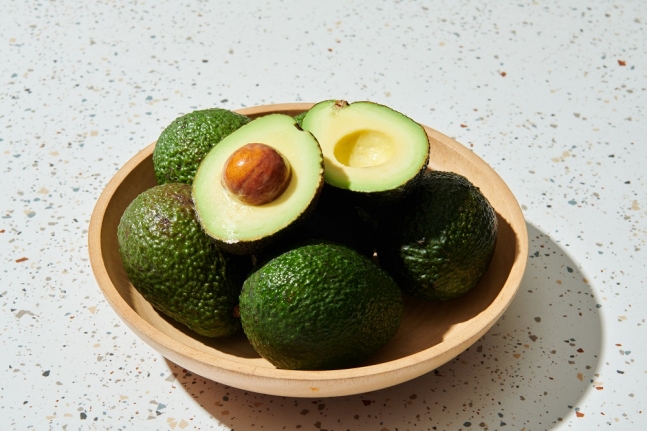
Eating 'this fruit' once a day... Effect of cleansing the blood
2024.07.29 01:07
Views Likes Scraps
More than ways to enjoy delicious avocados...
It's easier to buy already cut ripe avocados, haha.
Of course... It's also difficult to find delicious avocados...
My mom bought an avocado and ate it... she said she would never eat it again haha
But it's really a good fruit..
Commercial avocado drinks also contain liquid fructose, which is not very good for you due to its ingredients...
You should also consider how to eat well and buy properly prepared avocados that taste good.
Oh.. since there's avocado puree, I should consider that as well.
-------------------------------------------

A study has shown that eating one avocado a day can lower blood lipid levels and reduce the risk of cardiovascular disease.
Pennsylvania State University researcher Dr. Zanha Vi Damani's team conducted an analysis of the 'Habitual Diet and Avocado Experiment' involving approximately 1,000 participants from June 27, 2018, to March 4, 2020. Participants were randomly assigned to either a group that consumed one avocado daily for six months or a group that followed a regular diet but consumed fewer than two avocados per month. Subsequently, based on the '8 Essential Cardiac Health Guidelines (Life's Essential 8)' announced by the American Heart Association (AHA), the quality of participants' diets, blood sugar, blood pressure, BMI, blood lipids, physical activity, and sleep health were evaluated.
As a result, participants who followed a regular diet while intentionally avoiding avocados experienced a decrease in cardiovascular health scores, but no such decline was observed in the group that consumed one avocado daily. Additionally, those who ate an avocado every day showed improvements in sleep health, diet quality, and blood lipid levels such as cholesterol. The research team stated that avocados can improve cardiovascular risk factors by reducing bad cholesterol LDL, which causes inflammation in blood vessels, without negatively affecting body weight. High blood cholesterol can harden and narrow arteries, leading to atherosclerosis and blood clots, which can potentially result in fatal cardiovascular diseases such as myocardial infarction.
Avocado is a fruit rich in nutrients such as potassium, unsaturated fats, dietary fiber, and folate. Although it has relatively high calories, it is abundant in vitamin E, which helps prevent cancer and aging. It also has a positive effect on gut health.
Avocado can be used as a topping for salads, toast, and other dishes, or blended into smoothies. It can also be made into spreads for various uses. Since vitamins are preserved even when frozen, you can cut it, remove the seed, peel it, and freeze it to eat later.
This research result was presented at 'Nutrition 2024' held recently in Chicago.
Pennsylvania State University researcher Dr. Zanha Vi Damani's team conducted an analysis of the 'Habitual Diet and Avocado Experiment' involving approximately 1,000 participants from June 27, 2018, to March 4, 2020. Participants were randomly assigned to either a group that consumed one avocado daily for six months or a group that followed a regular diet but consumed fewer than two avocados per month. Subsequently, based on the '8 Essential Cardiac Health Guidelines (Life's Essential 8)' announced by the American Heart Association (AHA), the quality of participants' diets, blood sugar, blood pressure, BMI, blood lipids, physical activity, and sleep health were evaluated.
As a result, participants who followed a regular diet while intentionally avoiding avocados experienced a decrease in cardiovascular health scores, but no such decline was observed in the group that consumed one avocado daily. Additionally, those who ate an avocado every day showed improvements in sleep health, diet quality, and blood lipid levels such as cholesterol. The research team stated that avocados can improve cardiovascular risk factors by reducing bad cholesterol LDL, which causes inflammation in blood vessels, without negatively affecting body weight. High blood cholesterol can harden and narrow arteries, leading to atherosclerosis and blood clots, which can potentially result in fatal cardiovascular diseases such as myocardial infarction.
Avocado is a fruit rich in nutrients such as potassium, unsaturated fats, dietary fiber, and folate. Although it has relatively high calories, it is abundant in vitamin E, which helps prevent cancer and aging. It also has a positive effect on gut health.
Avocado can be used as a topping for salads, toast, and other dishes, or blended into smoothies. It can also be made into spreads for various uses. Since vitamins are preserved even when frozen, you can cut it, remove the seed, peel it, and freeze it to eat later.
This research result was presented at 'Nutrition 2024' held recently in Chicago.
1
0
Comments 4